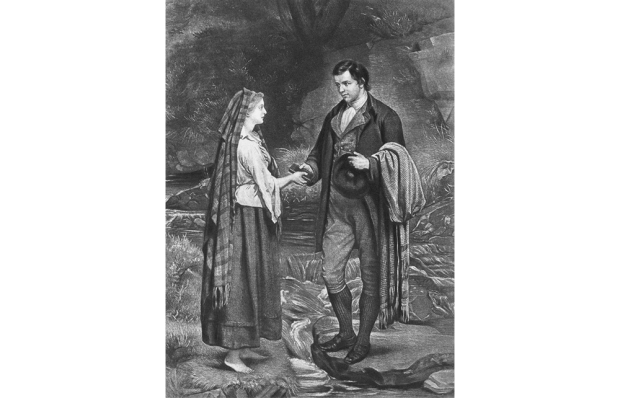In Competition No. 3064 you were invited to supply a newspaper leading article exposing the hitherto unsuspected corrupting influence of a seemingly innocuous everyday item. This assignment was inspired by the revelation, in a recent letter to the Times, that patent leather shoes were outlawed at a British girls’ public school as recently as the 1980s, lest they reflect undergarments and ‘excite the gardeners’.
It was a smallish field with a narrow focus. You divided fairly equally between those who consider fruit (bananas, in particular) to be the Devil’s work and those who reckon that the real threat to vulnerable young minds is cutlery. As usual with this type of challenge, the entries that stood out were those that retained a crumb, however small, of plausibility. Nicholas Stone was good but his piece was written as a news report rather than a leading article and so I reluctantly disqualified it.
Bill Greenwell takes the bonus fiver. His fellow winners earn £30 each.
It cannot even be decided in polite society what species it belongs to. Its pronunciation is cause for dissent. Its name derives from a word for ‘swelling’. What kind of right-minded authority would permit the tomato to be part of a young person’s diet? Its skin is glossy, and a cheap bright red; it leans against the lips, curvaceous; it spurts seeds; its flesh is thick and rich. Everything about the tomato reeks of decadence. We desire for our young people a more edifying range of comestibles than something the colour of lipstick and the hue of shame: the firm, upstanding leek, for instance, or the more aggressive lemon. We have seen where tomato worship has led: to the use of recreational drugs, to the prevalence of fast food, to the fondling of mobile phones. A tomato is nothing more than a bordello of suggestibility. Let them eat potatoes.
Bill Greenwell
This newspaper calls on the government to ban spoons with immediate effect. Every day, at educational establishments the length and breadth of Britain, otherwise healthy children and adolescents are being rendered introspective from gazing at their distorted — perverted would not be too strong a term — reflections in the bowls or on the backs of spoons. How can our young have a correct apprehension of themselves — and, by extension, others — while being consistently lied to by proletarian utensils incapable of reflecting naturalistically the faces so casually entrusted to them? It should not surprise that our hospitals are crammed with young people — variously obese, anorexic, depressed and in search of the remedies of the cosmetic surgeon — as a consequence of these traumatic experiences. It is time we quite literally stopped ‘spooning’ — that antique verb always connoted sexual depravity — and confined our children to the dexterity-inculcating world of knife and fork.
Adrian Fry
The proposed banning of the sale of books in the UK is to be applauded. We think people in this country have had enough of ideas. If the Good Lord had intended the British people to think, He would have given them brains. Books are a dangerous corrupting influence. Their appeal is subtle, deceptively seductive. Unsuspecting readers might start with something placing no demands on critical functions, then move on from Dan Brown to God knows what subversive ideology, and before you know it, democracy will be in crisis. The privileged metropolitan quinoa-consuming elite are already brainwashing our children with Summer Bloody Reading Challenges and subliminal Europhile references to Madame Gazelle and Pedro Pony. Eventually the adult population would have deserted the Great British Celebrity Burger-Off, Darlington’s Got Talent etc, and would be wasting time in Waterstones, Brontë in one hand and skinny latte in the other. God help us.
David Silverman
It is always unfortunate when blameless innocence becomes tainted by a disagreeable association. But that, it must be said, is the present fate of the humble bicycle clip. This inexpensive but practical device had a previous quite unexceptionable moment of symbolic significance when Philip Larkin, in ‘Church Going’, took off his cycle-clips ‘in awkward reverence’. But articles of restraint have now to be seen in a different social context. Whilst a sprung clip is plainly not a handcuff, its manacle-like form shades suggestively into an object of that kind. It speaks, tout court, of masculine control. So when put to use it is likely to appear objectionably provocative. As such it has no more place in a modern street than a wolf whistle. And, we may add, it is not as if trouser bottoms may not, at minimal inconvenience, be tucked into the tops of socks with offence to no one.
W.J. Webster
The Guardian has never favoured proscriptive legislation where the voluntary consent of civil society can resolve contentious issues. Nonetheless, the principle of a hands-off libertarian modus vivendi must be balanced by a recognition that, where communal accord is absent or unavailing, a resort to legal coercion may be the pis aller.Not everyone will instantly see the application of this carefully calibrated approach to soft furnishings. Yet as our loyal readers often remind us, the Guardian’s vital role in exposing hidden or under-reported sources of malfeasance has driven forward exciting and responsible journalism. We are not citing the encouragement of idleness and bad posture or the harbouring of dust mites alone. Though exact figures are difficult to come by, recent studies indicate that the ‘Othello syndrome’ — smothering by cushion or pillow — is on the increase. In short, our homes are packed with inviting murder weapons.
Basil Ransome-Davies
No. 3067: holiday hell
Once upon a time the Observer ran a column entitled ‘My crap holiday’. You are invited to provide a tale of travel misery on behalf of a well-known traveller from the fields of fact or fiction. Please email entries of up to 150 words to lucy@spectator.co.uk by midday on 19 September.
Got something to add? Join the discussion and comment below.
Get 10 issues for just $10
Subscribe to The Spectator Australia today for the next 10 magazine issues, plus full online access, for just $10.
You might disagree with half of it, but you’ll enjoy reading all of it. Try your first month for free, then just $2 a week for the remainder of your first year.













Comments
Don't miss out
Join the conversation with other Spectator Australia readers. Subscribe to leave a comment.
SUBSCRIBEAlready a subscriber? Log in